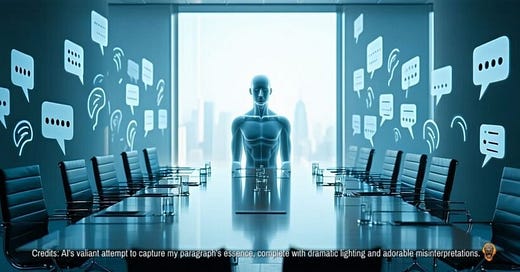Workplace spirituality? Pure comedy gold.
The corporate world thrives on ego, making non-duality concepts seem absurdly out of place in this realm of competition and status-seeking.
Picture yourself in a performance review, explaining to your bewildered boss that the “self” who missed those deadlines doesn’t actually exist, or suggesting that the stressed-out executive investigate “who” feels stressed. Career suicide served with a side of metaphysical gibberish.
The entire corporate structure operates on the foundation of separate selves competing, collaborating, and suffering for egoic rewards like promotions and recognition.
Yet non-dual understanding isn’t useless in this bizarre ego carnival, just wildly misunderstood and misapplied…
…it’s about internal liberation, not external revolution.
Stress Without the Stressed
Workplace anxiety dissolves without a victim.
When you recognize there’s no central “me” whose survival depends on the next promotion, you undermine the very foundation of workplace suffering and neurotic anxiety.
That project deadline still looms like a guillotine over the department, your inbox still overflows with urgent demands, and your colleague still chews with his mouth open during lunch meetings. But something fundamental shifts – the personal charge drains from these situations like air from a punctured tire. The pressure remains while the suffering evaporates into the void from which it came. The stress exists, but the stressed one doesn’t.
This isn’t some fluffy mindfulness technique to “manage” your stress better; it’s the radical recognition that the entity feeling stressed was fictional from the start.
The deadlines and pressure continue their dance, but without a dancer to torment…
…the show becomes just another empty performance.
The Outcome Obsession Cure
Success and failure lose their sting.
The corporate ego lives in a perpetual hostage situation – success validates its existence while failure threatens its very identity and security within the tribe.
Watch how your coworkers ride the emotional rollercoaster of quarterly results, performance metrics, and client feedback. See how they beam with pride or collapse in shame based on outcomes entirely beyond their control. Marvel at how they’ve staked their entire sense of self-worth on whether some numbers move up or down on a spreadsheet that will be forgotten next quarter. It would be hilarious if it weren’t so tragic.
Seeing through the self allows engagement without the desperate attachment to specific outcomes that characterizes the corporate hamster wheel.
The work appears and happens through you, but the sense of personal victory or defeat fades like morning fog…
…leaving only clear action without the emotional hangover.
Office Politics Immunity Booster
Criticism bounces off non-existent targets.
Office politics, difficult colleagues, and criticism trigger the ego’s defense systems like nothing else in the corporate battlefield of competing identities.
Your coworker takes credit for your idea in the meeting. Your boss criticizes your presentation in front of the team. The promotion goes to someone with half your experience but twice your networking skills. These are prime moments when the separate self screams for protection, recognition, and justice. The ego demands revenge, or at minimum, a lengthy venting session at the nearest bar.
Without identification as a vulnerable self needing protection, reactivity diminishes like a fire without oxygen.
You might still perceive unfairness or incompetence, but the personal sting vanishes when there’s no one to be stung…
…leaving responses unclouded by grievance or vendetta.
The Role-Playing Delusion
Corporate identities are elaborate costumes.
The workplace thrives on roles – boss, subordinate, expert, newbie – and the ego loves nothing more than to fully identify with these temporary functions as if they were real.
Watch how people transform when they get promoted. Suddenly they speak differently, carry themselves differently, make decisions differently – not because of new responsibilities, but because they’ve adopted a new identity costume. The nameplate on the door or title on the business card becomes fused with their sense of self. The same happens with the roles of victim, hero, martyr, or rebel that people adopt in workplace dramas.
Non-dual insight reveals these as temporary functions performed by body-mind mechanisms, not essential identities.
The function continues while the identification loosens its grip on your experience…
…like an actor who remembers it’s just a play.
The Mental Drama Exit Door
Workplace narratives lose their audience.
The mind generates endless workplace stories: “My boss doesn’t appreciate me,” “That colleague is trying to undermine me,” “I’ll never get ahead in this company.”
These narratives play on repeat in most employees’ minds, creating a parallel universe of drama that exists nowhere except in thought. People spend more energy navigating these fictional landscapes than dealing with actual work situations. They fight imaginary battles, nurse imaginary wounds, and plot imaginary revenge against characters who exist only in their mental movies.
With less identification with the self, these narratives find no fuel or audience to sustain their momentum.
Attention rests on the actual task rather than the mental drama about the task, person, or workplace…
…and the show closes due to lack of attendance.
The Invisible Revolution
Nothing changes, yet everything differs.
This approach isn’t about becoming the “enlightened employee” or using non-duality as the latest productivity hack to impress management.
The workplace remains exactly as it was – the meetings still drag on too long, the politics still play out in predictable patterns, the coffee still tastes like it was filtered through a gym sock. The corporate structure continues unchanged in its ego-driven glory. Your colleagues won’t notice anything different about you, except perhaps that you seem strangely unperturbed by things that used to trigger you.
The revolution happens in plain sight yet remains completely invisible to everyone around you.
The workplace doesn’t change, but the one who suffers about the workplace dissolves…
…and Reality couldn’t care less either way.










